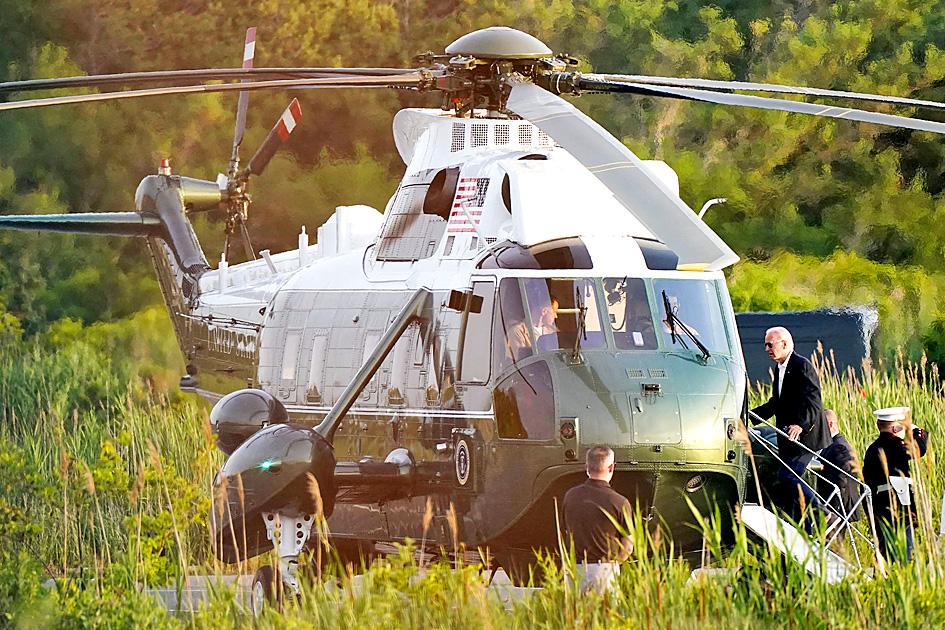Both houses of the US Congress have made progress on their respective drafts of an annual defense policy bill — the National Defense Authorization Act (NDAA) — that includes provisions to strengthen defense-related engagement with Taiwan.
In the US Senate, the Armed Services Committee on Thursday said that it had passed a draft version of the NDAA for fiscal year 2023 in a bipartisan 23-3 vote and had sent it to the full Senate for consideration.
A summary released by the committee said that the draft bill would require engagement with Taiwanese officials to develop and implement a multi-year plan for the acquisition of appropriate defensive capabilities.

Photo: Reuters
The bill would also mandate engagement with Taiwan on a series of combined training, exercises and planning activities, the committee said.
The US’ policy would be to maintain its armed forces “to deny a fait accompli against Taiwan,” to deter China from using military force to unilaterally change the “status quo” with Taiwan, the committee said in the summary.
The draft Senate bill calls for US$857.6 billion of defense spending, an increase of US$44 billion over the US$813.3 billion requested by US President Joe Biden.
That is an increase of US$87 billion from last year’s defense budget.
Meanwhile, the US House of Representatives’ Armed Services Committee on Monday released the full text of its draft version of the NDAA, which is still in the committee’s markup process and is to be reviewed today.
In its current form, the House’s draft bill largely hews to the final version of the NDAA that was signed into law last year, with the exception of an expanded “sense of Congress” section on US-Taiwan defense relations.
While last year’s version of the NDAA committed to supporting Taiwan’s acquisition of defense articles with an emphasis on asymmetric capabilities, this year’s draft specifies that this might include “anti-ship, coastal defense, anti-armor, air defense [and] undersea warfare” capabilities.
The section also contains a new phrase that says the US should be “committed to the defense of a free and open society in the face of aggressive efforts by [China] to curtail or influence the free exercise of rights or democratic franchise.”
The House draft would authorize a lower amount of US$802.4 billion of defense spending.
Typically, both houses of Congress pass their own versions of the NDAA and negotiate a reconciliation of the bill to be signed into law — a process that last year was not completed until December.

NATIONAL SECURITY THREAT: An official said that Guan Guan’s comments had gone beyond the threshold of free speech, as she advocated for the destruction of the ROC China-born media influencer Guan Guan’s (關關) residency permit has been revoked for repeatedly posting pro-China content that threatens national security, the National Immigration Agency said yesterday. Guan Guan has said many controversial things in her videos posted to Douyin (抖音), including “the red flag will soon be painted all over Taiwan” and “Taiwan is an inseparable part of China,” while expressing hope for expedited “reunification.” The agency received multiple reports alleging that Guan Guan had advocated for armed reunification last year. After investigating, the agency last month issued a notice requiring her to appear and account for her actions. Guan Guan appeared as required,

A Vietnamese migrant worker yesterday won NT$12 million (US$379,627) on a Lunar New Year scratch card in Kaohsiung as part of Taiwan Lottery Co’s (台灣彩券) “NT$12 Million Grand Fortune” (1200萬大吉利) game. The man was the first top-prize winner of the new game launched on Jan. 6 to mark the Lunar New Year. Three Vietnamese migrant workers visited a Taiwan Lottery shop on Xinyue Street in Kaohsiung’s Gangshan District (崗山), a store representative said. The player bought multiple tickets and, after winning nothing, held the final lottery ticket in one hand and rubbed the store’s statue of the Maitreya Buddha’s belly with the other,

‘NATO-PLUS’: ‘Our strategic partners in the Indo-Pacific are facing increasing aggression by the Chinese Communist Party,’ US Representative Rob Wittman said The US House of Representatives on Monday released its version of the Consolidated Appropriations Act, which includes US$1.15 billion to support security cooperation with Taiwan. The omnibus act, covering US$1.2 trillion of spending, allocates US$1 billion for the Taiwan Security Cooperation Initiative, as well as US$150 million for the replacement of defense articles and reimbursement of defense services provided to Taiwan. The fund allocations were based on the US National Defense Authorization Act for fiscal 2026 that was passed by the US Congress last month and authorized up to US$1 billion to the US Defense Security Cooperation Agency in support of the

DAREDEVIL: Honnold said it had always been a dream of his to climb Taipei 101, while a Netflix producer said the skyscraper was ‘a real icon of this country’ US climber Alex Honnold yesterday took on Taiwan’s tallest building, becoming the first person to scale Taipei 101 without a rope, harness or safety net. Hundreds of spectators gathered at the base of the 101-story skyscraper to watch Honnold, 40, embark on his daredevil feat, which was also broadcast live on Netflix. Dressed in a red T-shirt and yellow custom-made climbing shoes, Honnold swiftly moved up the southeast face of the glass and steel building. At one point, he stepped onto a platform midway up to wave down at fans and onlookers who were taking photos. People watching from inside